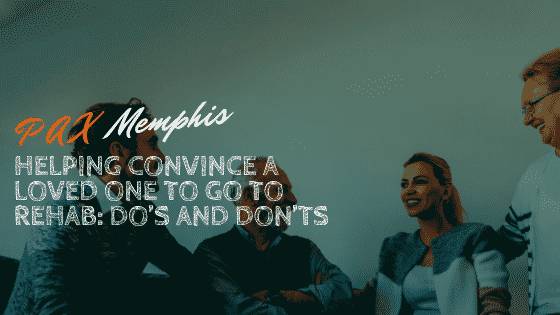If your loved one is stuck in their addiction and refusing to go to rehab, you probably feel overwhelmingly hopeless. It may seem that no matter what you do, they simply won’t get the help they desperately need. It is terrifying to watch a loved one go down such a dangerous road, especially knowing that their life is at risk if they don’t get help. Watching a loved one spiral down a treacherous road ravaged by drug addiction is one of the most painful things that anyone can endure.
Fearing that your loved one will continue to refuse help, harm themselves or others, and continue using often times leads families to enable their loved one or act out in ways that will not encourage their loved one to seek treatment. However, it is important to know how you can help your loved one get into rehab.
Don’ts
1. Don’t blame yourself. It is common for family members of an addicted loved one to blame themselves for the situation. Before you attempt to get your loved one to go to rehab, it is imperative to know that you are not at fault. You didn’t cause your loved one’s addiction and you cannot control it.
Admitting and accepting that you are not to blame for your loved one’s addiction will help alleviate any hard feelings you may have toward your loved one. Harboring resentments will only stop your ability and desire to help them.
2. Don’t enable your addicted loved one. Enabling an addicted loved one is easy to do and difficult to stop. Although enabling behaviors typically lie behind the best of intentions, these behaviors will only allow your loved one’s addiction to progress further. Some ways you may be enabling your loved one include offering them a place to stay knowing they are using drugs, giving them money that will likely feed their addiction, bailing a loved one out of jail or other consequences, and lying to cover up your loved one’s addictive behaviors.
3. Don’t harass your loved one to go to rehab. Persistent nagging and begging will only annoy your addicted loved one and push them further away from you. Remember that a person who suffers from addiction may be in a fragile state of mind and can be easily aggravated. More often than not, an addict has to hit an emotional bottom before they are ready to accept treatment. When the time comes, your loved one will be more likely to approach you for help if they feel support rather than pressure.
Do’s
1. Do learn about the disease of addiction and the benefits of rehab. While it can be extremely difficult to understand addiction if you have never experienced it yourself, you can take actions to educate yourself as much as possible about the disease of addiction. Remember that people who suffer from addiction have lost the power of choice regarding whether or not they get high. Their addiction lies in their brain and they suffer from an incessant compulsion to use. Other ways to educate yourself about the disease of addiction include attending support groups like Nar-Anon or Al-Anon and speaking to an addiction specialist at a drug rehab near you. Once you have learned about the disease of addiction, you can also become familiar with the benefits of rehab. Rehab will treat the symptoms of your loved one’s addiction through integrated therapy and provide them with healthy coping mechanisms to prevent relapse.
2. Do set healthy boundaries. Rather than enabling your addicted loved one, setting healthy boundaries will show them that you will no longer tolerate their addictive behaviors.
Healthy boundaries aren’t always easy and it usually involves practicing tough love.
This means refusing to give them money, refusing to let them stay with you, and letting them experience the consequences of their addiction head-on. If an addict can continue their habit in peace, there is no need for them to go to rehab. However, allowing them to endure the consequences of their drug use will encourage them to seek treatment sooner than later.
3. Do let them know you are available to help them get into a drug rehab when they are ready. Ultimately, it is your loved one’s decision as to whether or not they want to go to rehab. Rather than nagging or enabling, you should enforce the boundaries you have set and assure your loved one that you will be there to help when they are ready to go to treatment. Many people who suffer from addiction may be in a constant state of denial. They may not recognize that they have a problem and nothing you can say to them can change that state of mind. However, offering your support allows them to know where to turn when they are ready to get help.
How PAX Memphis Drug Rehab Can Help
It is important to have a plan in place for when your addicted loved one is ready to go to rehab. A conversation with an addiction specialist at PAX Memphis can help you formulate your plan of action, educate you about the rehabilitation process, and prepare you to participate in your loved one’s recovery. (store.spaceylon.com) At PAX Memphis, we understand that addiction not only affects the person suffering but their family and loved ones as well.
Medically Reviewed: September 25, 2019

All of the information on this page has been reviewed and verified by a certified addiction professional.










